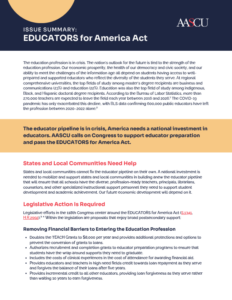Issue Summary
EDUCATORS for America Act
The educator pipeline is in crisis, America needs a national investment in educators. AASCU calls on Congress to support educator preparation and pass the EDUCATORS for America Act.
The education profession is in crisis. The nation’s outlook for the future is tied to the strength of the education profession. Our economic prosperity, the health of our democracy and civic society, and our ability to meet the challenges of the information age all depend on students having access to well prepared and supported educators who reflect the diversity of the students they serve. At regional comprehensive universities, the top fields of study among master’s degree recipients are business and communications (23%) and education (22%). Education was also the top field of study among indigenous, Black, and Hispanic doctoral degree recipients. According to the Bureau of Labor Statistics, more than 270,000 teachers are expected to leave the field each year between 2016 and 2026. The COVID-19 pandemic has only exacerbated this decline, with BLS data confirming 600,000 public educators have left the profession between 2020–2022 alone.
States and local communities need help.
States and local communities cannot fix the educator pipeline on their own. A national investment is needed to mobilize and support states and local communities in building anew the educator pipeline that will ensure that all schools have the diverse, profession-ready teachers, principals, librarians,
counselors, and other specialized instructional support personnel they need to support student development and academic achievement. Our future economic development will depend on it.
Legislative action is required.
Legislative efforts in the 118th Congress center around the EDUCATORS for America Act (S.1341, H.R.2992). Within the legislation are proposals that enjoy broad postsecondary support:
Removing Financial Barriers to Entering the Education Profession
- Doubles the TEACH Grants to $8,000 per year and provides additional protections and options to prevent the conversion of grants to loans.
- Authorizes recruitment and completion grants to educator preparation programs to ensure that students have the wrap around supports they need to graduate.
- Includes the costs of clinical experiences in the cost of attendance for awarding financial aid.
- Provides educators and teachers in high need fields credit towards loan repayment as they serve and forgives the balance of their loans after five years.
- Provides incremental credit to all other educators, providing loan forgiveness as they serve rather than waiting 10 years to earn forgiveness.
Updating and Expanding the Teacher Quality Partnership Grant Program
- Directs focus on residency programs, strengthens the principal and school leader preparation programs, and enables partnerships to address the need for early childhood educators, school librarians, counselors, and other specialized support personnel.
Reauthorizing the Augustus F. Hawkins Centers of Excellence Program
- Increases support to historically Black colleges and universities, Hispanic-serving institutions and other minority-serving institutions in expanding and strengthening their educator preparation programs, which is critically important to solve the growing disparity between the educators in the schools and the students they teach.
- Even though over 50% of students identify as people of color and multiple studies have shown that racial diversity can provide significant benefits to students, a 2018 Department of Education report showed that only 20% of public-school teachers identified as a person of color, a figure that has barely changed since 2000.
Increasing the Capacity of Educator Preparation Programs
- Increases program capacity to meet the needs of the field, including supporting school leader development and faculty professional development and training, offering doctoral fellowships, and promoting innovation and resiliency.
- Establishes an education careers opportunity program to expose middle and high school students to the education profession.
Data Sources
- Torpey, E. (2018, October). Projections for teachers: How many are leaving the occupation?Career Outlook. Retrieved March 3, 2023.
- Walker, T. (2022, February 1). Survey: Alarming Number of Educators May Soon Leave the Profession. NeaToday. Retrieved March 10, 2023
- S.1341 – 118th Congress (2023-2024): EDUCATORS for America Act. (n.d.). Congress.gov. Retrieved May 10, 2023.
- H.R.2992 – 118th Congress (2022-2024): EDUCATORS for America Act. (n.d.). Congress.gov. Retrieved May 10, 2023.
- National Center for Education Statistics. (2022). Racial/ethnic enrollment in public schools. Condition of Education. U.S. Department of Education, Institute of Education Sciences. Retrieved March 2, 2023.
- Goldhaber, D., Theobald, R., & Tien, C. (2019, January 21). Why we need a diverse teacher workforce. Phi Delta Kappan. Retrieved February 27, 2023.
- Spiegelmen, M. (2020, September). Race and ethnicity of public school teachers and their students. Data Point: U.S. Department of Education NCES 2020-103. Retrieved February 28, 2023.
Questions about the EDUCATORS for America Act? Let us know.
"*" indicates required fields
